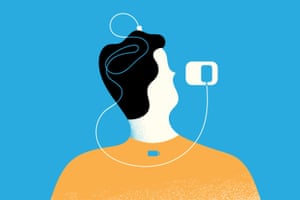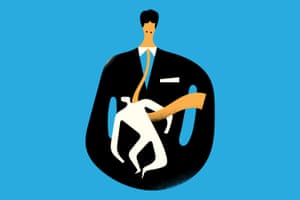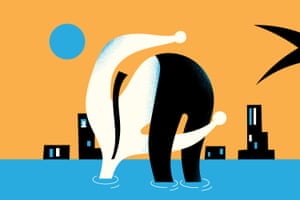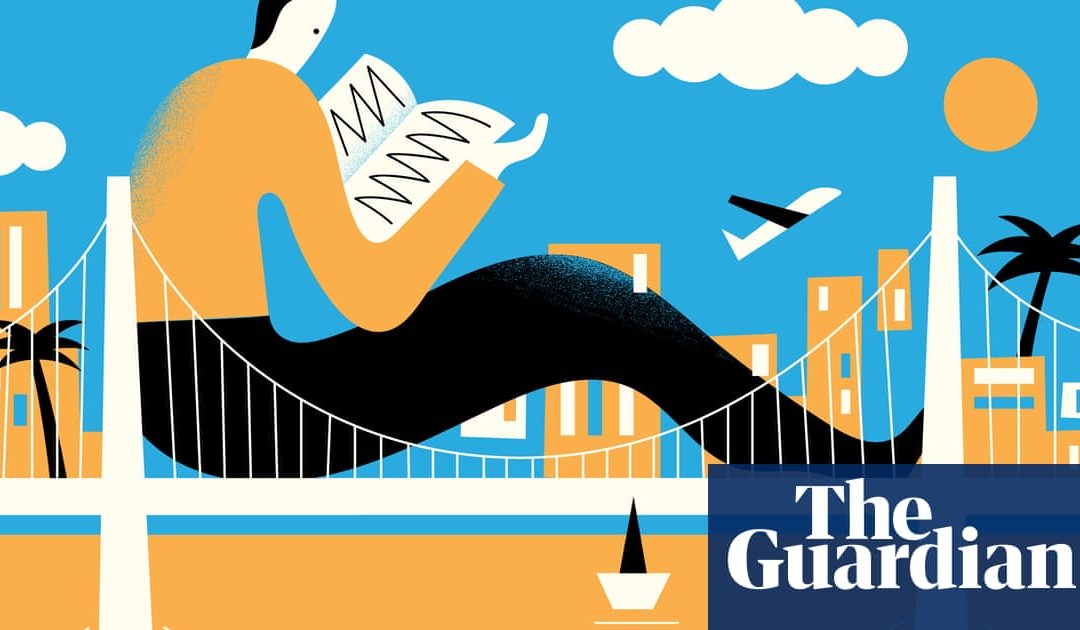Your guide to understanding an industry where capitalism is euphemized

What is Silicon Valley?
For Californians of a certain tenure, Silicon Valley is a location an actual, geological valley nestled between two mountain ranges and the marshy southern dregs of the San Francisco bay. The titans of technology Adobe, Alphabet, Apple, eBay, Facebook, HP, Intel and Oracle are all headquartered in the valley itself.
But as the tech industrys dominance has expanded, so, too, have Silicon Valleys boundaries. The phrase has come to represent something that is both more and less than the tech industry as a whole.
If the name represents anything at all, it is a way of thinking and talking, a mindset expressed through a shared vocabulary: the vocabulary of bullshit. Where Wall Street is capitalism unvarnished, Silicon Valley is capitalism euphemized.
Here is a lexicon of Silicon Valley: a map for travelers to find their way through the wilds of billion dollar lies.
Airbnb (n) A hotel company that figured out how to avoid the expense of owning hotels or employing hotel workers. See unicorn. (v) To illegally convert an apartment into a vacation rental in a city with an affordable housing crisis.
Amazon (n) A website that went from selling books to selling virtually all items on Earth; its also a movie studio, book publisher, major grocery chain owner, hardware manufacturer, and host for most of the internet, to name just a few endeavors. Competitors in nearly every industry fear its might. Formerly known as the everything store; soon to be known as the only store.
angel investor (phrase) A wealthy individual who invests a small amount of startup capital at the earliest stages of a company or idea. Often, the angel is part of the entrepreneurs extended network, whether because they went to the same college, worked together at a previous company, or are family friends. Frequently a vocal opponent of affirmative action. See also meritocracy.
apology (n) A public relations exercise designed to change headlines. In practice, a promise to keep doing the same thing but conceal it better. People need to be able to explicitly choose what they share, said Mark Zuckerberg in a 2007 apology, before promising better privacy controls in a 2010 mea culpa, vowing more transparency in 2011, and acknowledging mistakes in the Cambridge Analytica scandal. See Facebook, privacy.
Apple (n) Americas first trillion-dollar company, which achieved inordinate success through groundbreaking products such as the Macintosh, iPod and iPhone. After it ran out of ideas for new products, Apple maintained its dominance by coming up with new ways to force its customers to purchase expensive accessories. See dongle.

artificial intelligence (ph) Computers so smart that their behavior is indistinguishable from that of humans. Often achieved by secretly paying real humans to pretend theyre robots.
Autopilot (n) The name Tesla gives to its advanced driver assistance system, ie souped-up cruise control. Named after the advanced technology that allows pilots to take their hands off the controls of a plane, but very much not an invitation for Tesla drivers to take their hands off the wheel, right, Elon?
bad actors (ph) People who use a social media platform in a way that results in bad press. Bad actors usually take advantage of features of the platform that were clearly vulnerable for abuse but necessary to achieve scale. The Russian intelligence operatives who used Facebooks self-serve advertising system to target US voters with divisive and false messages were bad actors.
biohacking (n) Applying the DIY hacker ethos to ones own body to achieve higher performance. Often involves bizarre eating habits, fasting, inserting microchips into ones body, and taking nootropics (aka expensive nutritional supplements). When done by women, dieting. In extreme forms, an eating disorder.
bootstrap (v) To start a company without venture capital. The only option for the vast majority of people who start companies, but a point of pride for the tiny subset of entrepreneurs who have access to venture capital and eschew it. My dad is friends with Tim Draper but I wanted to do something on my own so Im bootstrapping a tech bro.
cloud, the (n) Servers. A way to keep more of your data off your computer and in the hands of big tech, where it can be monetized in ways you dont understand but may have agreed to when you clicked on the Terms of Service. Usually located in a city or town whose elected officials exchanged tens of millions of dollars in tax breaks for seven full-time security guard jobs.
data (n) A record of everything you do involving the internet which is increasingly synonymous with everything you do, period. Corporations use the digital trails you and millions of others leave to sell you things in other words, your actions, relationships, and desires have become currency. See privacy.
deprecated (adj) A description for a software feature that is no longer being updated and will likely be phased out soon.
disrupt (v) To create a new market, either by inventing something completely new (ie the personal computer, the smart phone) or by ignoring the rules of an old market. If the latter, often illegal, but rarely prosecuted. Uber disrupted the taxi industry by flooding the market with illegal cabs, while Airbnb disrupted the hotel market by flooding the market with illegal sublets. See sharing economy.
diversity and inclusion (ph) Initiatives designed to sugarcoat Silicon Valleys systematic failure to hire, promote and retain African American and Latinx employees. The phrase is usually invoked when a company is expounding on its values in response to incontrovertible evidence of widespread racial or gender discrimination.
dongle (n) A small, expensive and easily misplaced piece of computer gear. Usually required when a company revolutionizes its products by getting rid of all the ports that are compatible with the accessories you already own. See Apple.
Dont Be Evil (ph) Googles original corporate motto. Deprecated.
employee (n) People who work for a tech company and are eligible for health insurance and retirement benefits. Importantly, this does not necessarily include the vast majority of people who perform work for the company and create its value, such as the people who drive for transportation companies, the people who deliver for delivery companies, and the cooks, cleaners, security guards and parking attendants on tech campuses. Less than 50% of Googles global workforce. See Uber, sharing economy, disruption, scale.

evangelist (n) A job title for salespeople who are slightly creepy in their cultish devotion to the product they are selling. I used to work in sales but now I evangelize Microsofts products.
FAANG (ph) An acronym for Facebook, Apple, Amazon, Netflix and Google. Originally coined to refer to the companys high-performing tech stocks, but also used to denote a certain amount of status. His boyfriend is a software engineer, but not at a FAANG so hes not really marriage material.
Facebook (n) Your moms favorite social media platform.
5G (n) The next generation of mobile internet, which promises to enable digital surveillance at blindingly fast speeds.
free speech (ph) A constitutionally protected right in the US that is primarily invoked by tech bros and internet trolls when they are asked to stop being assholes. Syn: hate speech. See ideological diversity.
GDPR (ph) A comprehensive data protection law that applies to companies operating in Europe, including American ones. Though the safeguards dont apply directly to people outside Europe, the measure may push companies to step up their privacy efforts everywhere handy for Americans, whose own government has done a pretty poor job of protecting them.
gentrifier (n) A relatively affluent newcomer to a historically poor or working class neighborhood whose arrival portends increased policing, pricier restaurants and the eviction or displacement of longtime residents. Often used by gentrifiers as a general epithet for anyone who arrived in their neighborhood after they did.
Google (n) The privacy-devouring tech company that does everything that Facebook does, but manages to get away with it, largely because its products are useful instead of just depressing. (v) To make the bare minimum effort to inform oneself about something. What a tech bro did before he insisted on explaining your area of expertise to you.
ideological diversity (ph) The rallying cry for opponents of diversity and inclusion programs. Advocates for ideological diversity argue that corporate efforts to increase the representation of historically marginalized groups women, African Americans and Latinos, among others should also be required to increase the representation of people who believe that women, African Americans and Latinos are inherently unsuited to work in tech.
incubator (n) A parent company that takes baby companies under its wing until they can fly on their own; a playgroup for tech bros. See meritocracy.
IPO (n) Initial public offering when a company begins allowing regular people to buy shares. A way for everyone, not just venture capital firms, to lose money, as in Ubers recent disappointing IPO.
meritocracy (n) A system that rewards those who most deserve it, as long as they went to the right school. The tech industry is a meritocracy in much the same way that America is a meritocracy. Seediversity and inclusion.

microdosing (n) Taking small amounts of illegal drugs while white. It may be possible to microdose without writing a book or personal essay about it, but the evidence suggests otherwise.
mission (n) What separates a tech bro and a finance bro: the tech bro works for a company that has a mission. Usually something grandiose, utopian, and entirely inconsistent with the companys business model. Facebooks mission is to make the world more open and connected; Facebooks business model is to sell ads by dividing people into incredibly narrow marketing profiles.
monetize (v) To charge money for a product, or, to figure out how to extract money from people without their understanding or explicit consent. Though having a plan to monetize is usually the first step for a small business or startup (You mean I shouldnt just give the lemonade away for free?), angel investors and venture capitalists have created an environment in which companies can attempt to scale first and monetize later. My app is free because Im monetizing my users data.
Move fast and break things (ph) Facebooks original corporate motto. In hindsight, a red flag. Deprecated, allegedly.
off-site (n) A work event at a non-work location. Often includes alcohol and socializing. Primarily used when describing a sexual harassment complaint.
pivot (v) What tech startups do when they realize scaling is not a business model without a monetization strategy.
platform (n) A website that hosts user-generated content. Platforms are distinct from publishers, which more directly commission and control the content they publish. In the US, platforms enjoy special legal status protecting them from liability for the content they host and allowing them to exercise broad discretion over which content they want to ban or delete. Facebook, YouTube, Reddit and Craigslist are examples of platforms. The reason Facebook says it does not have a policy that stipulates that the information you post on Facebook must be true.
privacy (n) Archaic. The concept of maintaining control over ones personal information.
revolutionize (v) To change something that does not need to be changed in order to charge money for its replacement. Apple revolutionized the experience of using headphones when it killed the headphone jack on iPhones.
runway (n) The amount of venture capital a startup has left before it has to either monetize its product, pivot, or start selling the office furniture. I cant believe Topher spent half our runway on a Tesla Roadster.
scale (v) The holy grail. To create a business that can accommodate exponential increases in users with minimal increases in costs. Also applicable if the costs can be externalized to taxpayers or countries in the global south. In the negative, a surprisingly effective excuse not to do something that any non-tech company would do. We would prefer not to foment genocide in Myanmar, but content moderation simply does not scale.
shadowban (v) The conspiracy theory that no one is responding to a social media post because the platform is secretly preventing the users content from being seen and/or going viral. Brandon was convinced that Twitter had shadowbanned him when no one responded to his demand that an SJW feminazi debate him.
sharing economy (ph) A system in which working does not mean being employed. See employees.
smart (adj) A product that is capable of being hooked up to the internet thus rendering it capable of being hacked or abusing your data.
Snapchat (n) Facebooks research and development department.
tech bro (n) A US-born, college-educated, Patagonia-clad male whose entry level salary at one of the FAANG companies was at least $125,000 and who frequently insists that his female co-workers give him high-fives. Typically works in product management or marketing. Had he been born 10 years earlier, he would have been a finance bro instead.

the FTC (n) The US Federal Trade Commission. Capable of leveraging enormous fines against companies like Facebook, potentially whittling down its revenues to just a handful of billions of dollars. Not really in that much of a hurry to do anything, however.
thought leader (n) An unemployed rich person.
Twitter (n) A mid-sized business with outsized importance due to its three primary users: Donald Trump, Elon Musk and journalists. A useful tool for journalists to gauge public opinion by talking to other journalists, and for Elon Musk to provoke lawsuits and federal investigations into security fraud.
Uber (n) A unicorn startup that disrupted the taxi industry by revolutionizing the sharing economy at incredible scale thanks to unprecedented amounts of venture capital. In the first earnings report after a lackluster IPO, revealed that it lost $1bn in three months.
unicorn (n) A startup valued at at least $1bn. At one point, rare. Increasingly, not even that exciting.
UX designer (n) The person responsible for a website or app users experience (UX). They make the buttons they want you to click on Share! Buy! Sign Up! large and noticeable, and the buttons that turn off location tracking very small.
venture capital (ph) A system by which wealthy individuals can invest in startups before they go public. A legal and surprisingly respectable form of gambling. An alternate retirement plan for 40-something multimillionaires who never developed hobbies.


Recent Comments